Analysis of People Management Strategies in UK Organisations: Report
VerifiedAdded on 2022/12/30
|10
|2525
|60
Report
AI Summary
This report provides an in-depth analysis of people management practices within UK organizations. It begins by outlining the key issues faced by line managers, such as managing a diverse workforce, retaining talent, adapting to remote work, providing training and development, resolving conflicts, evaluating expertise, and rewarding employees. The report then details the requirements of an effective people manager, emphasizing the importance of knowledge domain, behavioral aspects, organizational skills, and technological proficiency. Furthermore, the report evaluates key HR processes, including induction, training programs, performance plans, performance coaching, performance reviews, recognition ceremonies, and the role of guest invitees in employee motivation and development. The study highlights the interconnectedness of effective people management and performance management, underscoring the crucial roles of managers and HR in achieving organizational objectives.
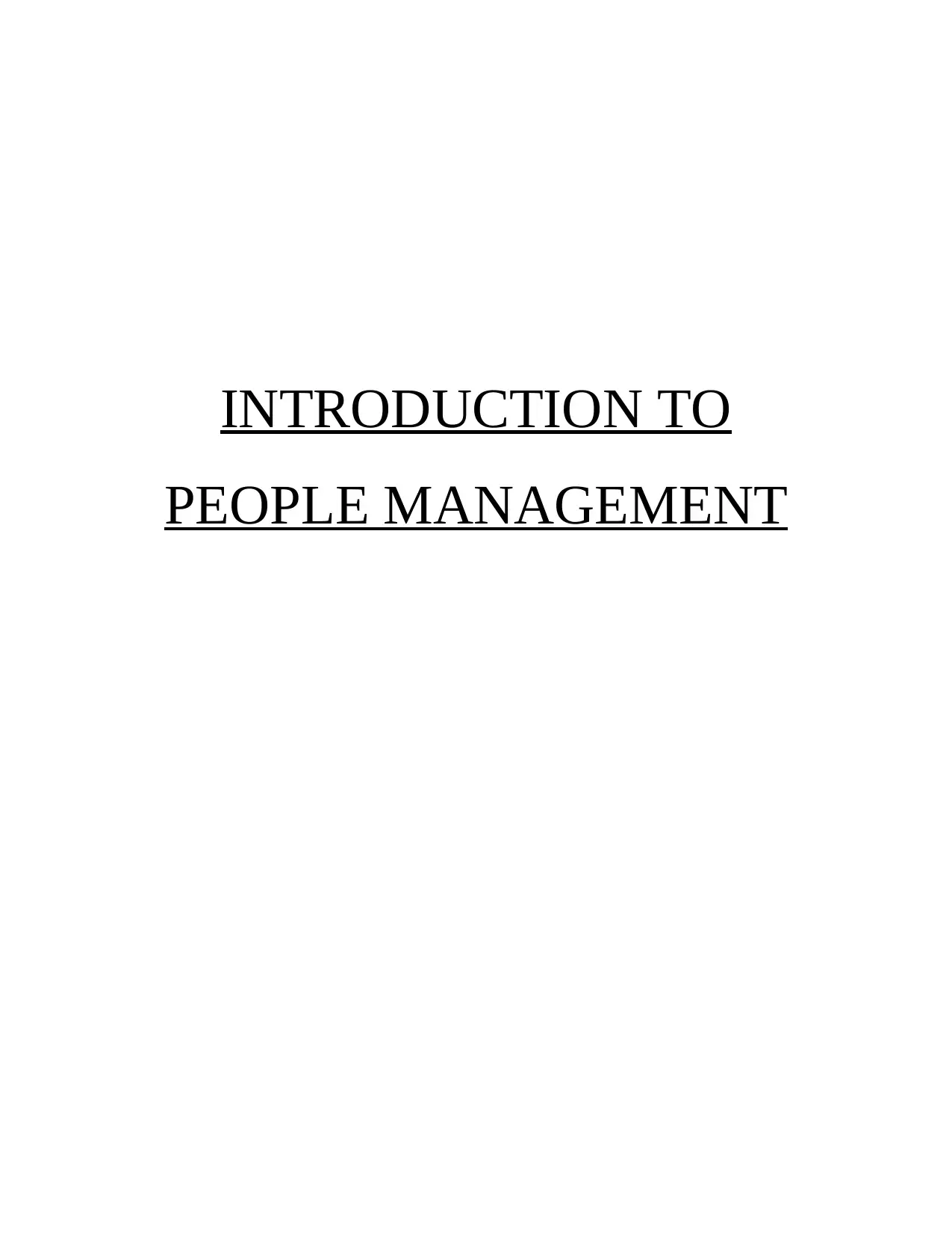
INTRODUCTION TO
PEOPLE MANAGEMENT
PEOPLE MANAGEMENT
Paraphrase This Document
Need a fresh take? Get an instant paraphrase of this document with our AI Paraphraser
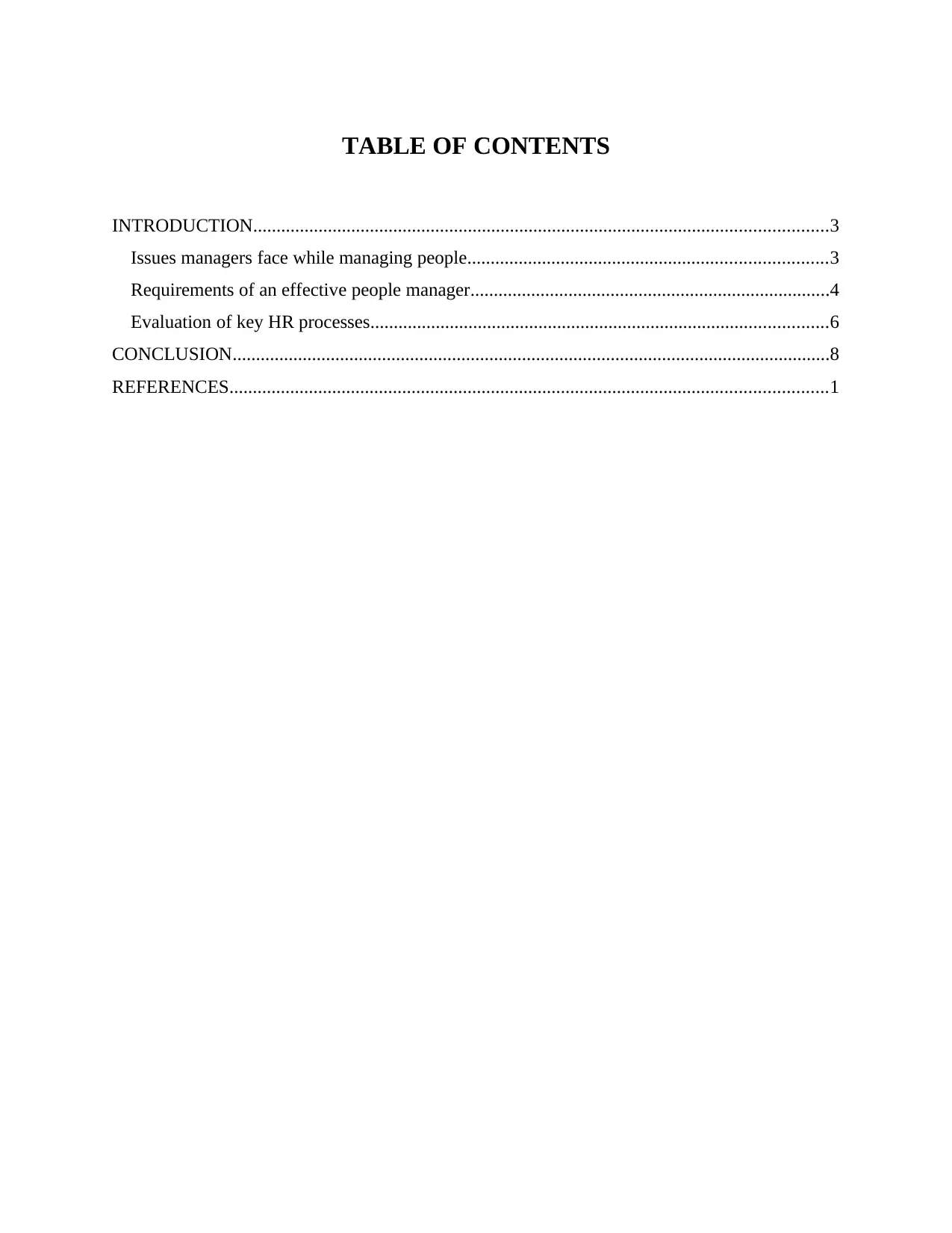
TABLE OF CONTENTS
INTRODUCTION...........................................................................................................................3
Issues managers face while managing people.............................................................................3
Requirements of an effective people manager.............................................................................4
Evaluation of key HR processes..................................................................................................6
CONCLUSION................................................................................................................................8
REFERENCES................................................................................................................................1
INTRODUCTION...........................................................................................................................3
Issues managers face while managing people.............................................................................3
Requirements of an effective people manager.............................................................................4
Evaluation of key HR processes..................................................................................................6
CONCLUSION................................................................................................................................8
REFERENCES................................................................................................................................1
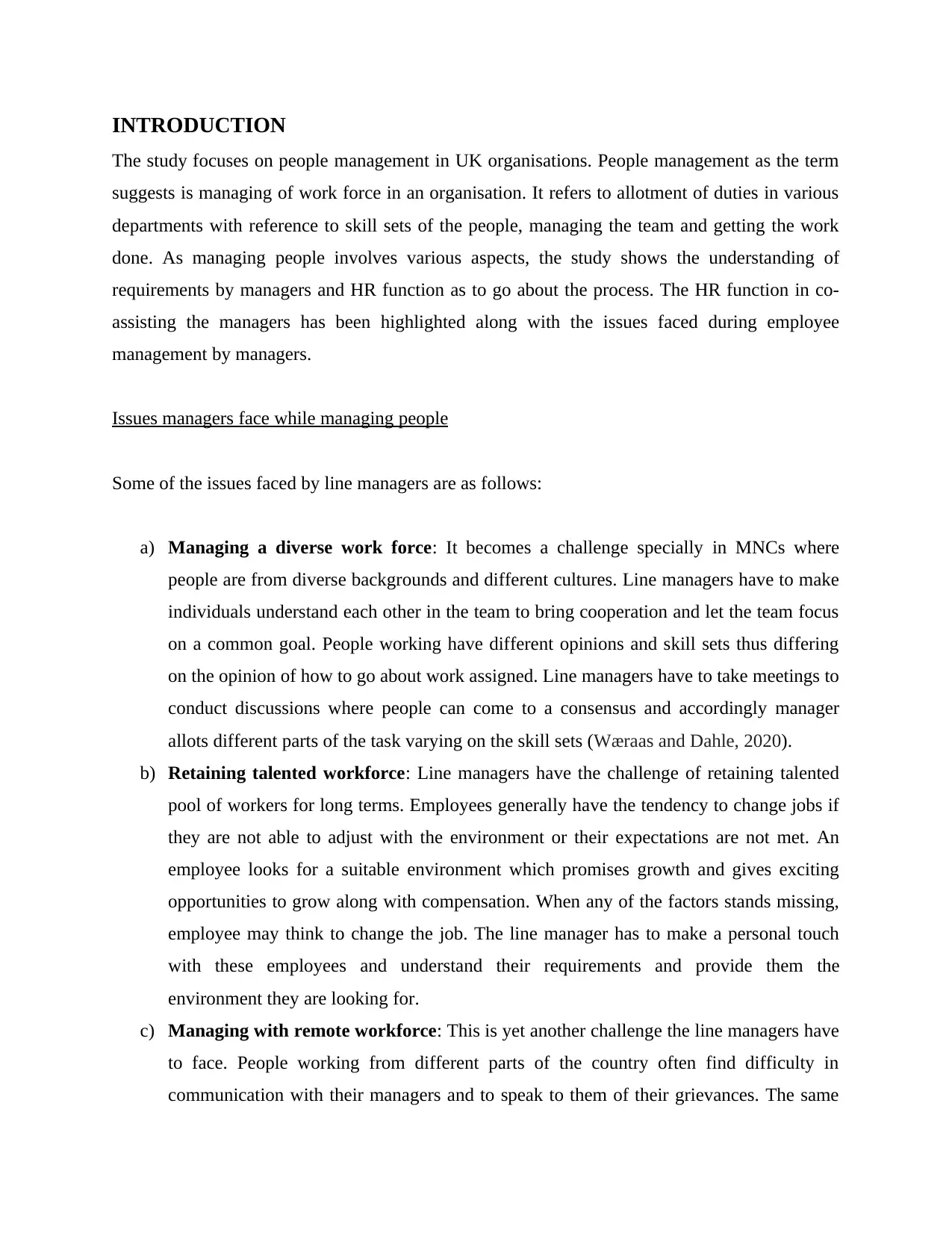
INTRODUCTION
The study focuses on people management in UK organisations. People management as the term
suggests is managing of work force in an organisation. It refers to allotment of duties in various
departments with reference to skill sets of the people, managing the team and getting the work
done. As managing people involves various aspects, the study shows the understanding of
requirements by managers and HR function as to go about the process. The HR function in co-
assisting the managers has been highlighted along with the issues faced during employee
management by managers.
Issues managers face while managing people
Some of the issues faced by line managers are as follows:
a) Managing a diverse work force: It becomes a challenge specially in MNCs where
people are from diverse backgrounds and different cultures. Line managers have to make
individuals understand each other in the team to bring cooperation and let the team focus
on a common goal. People working have different opinions and skill sets thus differing
on the opinion of how to go about work assigned. Line managers have to take meetings to
conduct discussions where people can come to a consensus and accordingly manager
allots different parts of the task varying on the skill sets (Wæraas and Dahle, 2020).
b) Retaining talented workforce: Line managers have the challenge of retaining talented
pool of workers for long terms. Employees generally have the tendency to change jobs if
they are not able to adjust with the environment or their expectations are not met. An
employee looks for a suitable environment which promises growth and gives exciting
opportunities to grow along with compensation. When any of the factors stands missing,
employee may think to change the job. The line manager has to make a personal touch
with these employees and understand their requirements and provide them the
environment they are looking for.
c) Managing with remote workforce: This is yet another challenge the line managers have
to face. People working from different parts of the country often find difficulty in
communication with their managers and to speak to them of their grievances. The same
The study focuses on people management in UK organisations. People management as the term
suggests is managing of work force in an organisation. It refers to allotment of duties in various
departments with reference to skill sets of the people, managing the team and getting the work
done. As managing people involves various aspects, the study shows the understanding of
requirements by managers and HR function as to go about the process. The HR function in co-
assisting the managers has been highlighted along with the issues faced during employee
management by managers.
Issues managers face while managing people
Some of the issues faced by line managers are as follows:
a) Managing a diverse work force: It becomes a challenge specially in MNCs where
people are from diverse backgrounds and different cultures. Line managers have to make
individuals understand each other in the team to bring cooperation and let the team focus
on a common goal. People working have different opinions and skill sets thus differing
on the opinion of how to go about work assigned. Line managers have to take meetings to
conduct discussions where people can come to a consensus and accordingly manager
allots different parts of the task varying on the skill sets (Wæraas and Dahle, 2020).
b) Retaining talented workforce: Line managers have the challenge of retaining talented
pool of workers for long terms. Employees generally have the tendency to change jobs if
they are not able to adjust with the environment or their expectations are not met. An
employee looks for a suitable environment which promises growth and gives exciting
opportunities to grow along with compensation. When any of the factors stands missing,
employee may think to change the job. The line manager has to make a personal touch
with these employees and understand their requirements and provide them the
environment they are looking for.
c) Managing with remote workforce: This is yet another challenge the line managers have
to face. People working from different parts of the country often find difficulty in
communication with their managers and to speak to them of their grievances. The same
⊘ This is a preview!⊘
Do you want full access?
Subscribe today to unlock all pages.

Trusted by 1+ million students worldwide
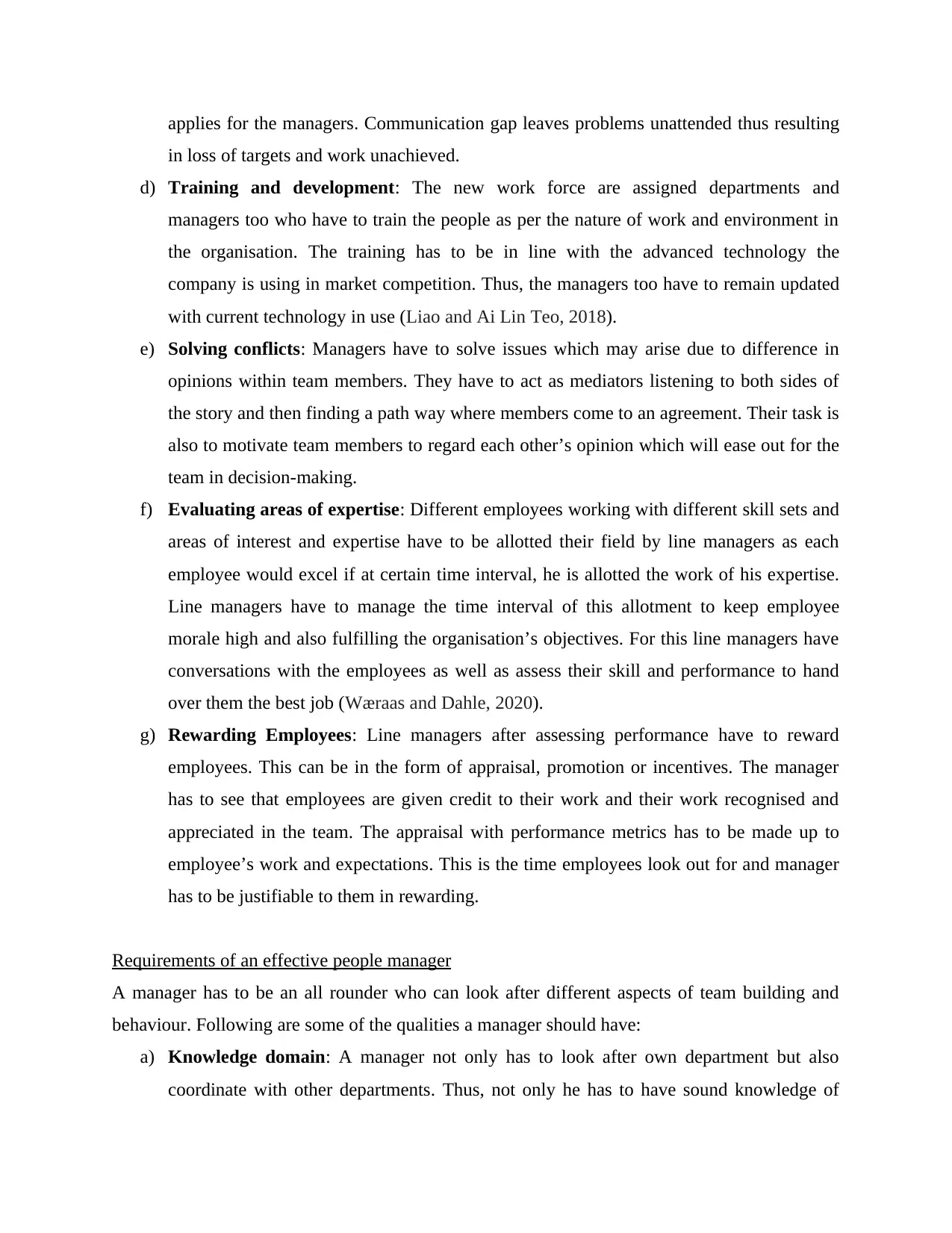
applies for the managers. Communication gap leaves problems unattended thus resulting
in loss of targets and work unachieved.
d) Training and development: The new work force are assigned departments and
managers too who have to train the people as per the nature of work and environment in
the organisation. The training has to be in line with the advanced technology the
company is using in market competition. Thus, the managers too have to remain updated
with current technology in use (Liao and Ai Lin Teo, 2018).
e) Solving conflicts: Managers have to solve issues which may arise due to difference in
opinions within team members. They have to act as mediators listening to both sides of
the story and then finding a path way where members come to an agreement. Their task is
also to motivate team members to regard each other’s opinion which will ease out for the
team in decision-making.
f) Evaluating areas of expertise: Different employees working with different skill sets and
areas of interest and expertise have to be allotted their field by line managers as each
employee would excel if at certain time interval, he is allotted the work of his expertise.
Line managers have to manage the time interval of this allotment to keep employee
morale high and also fulfilling the organisation’s objectives. For this line managers have
conversations with the employees as well as assess their skill and performance to hand
over them the best job (Wæraas and Dahle, 2020).
g) Rewarding Employees: Line managers after assessing performance have to reward
employees. This can be in the form of appraisal, promotion or incentives. The manager
has to see that employees are given credit to their work and their work recognised and
appreciated in the team. The appraisal with performance metrics has to be made up to
employee’s work and expectations. This is the time employees look out for and manager
has to be justifiable to them in rewarding.
Requirements of an effective people manager
A manager has to be an all rounder who can look after different aspects of team building and
behaviour. Following are some of the qualities a manager should have:
a) Knowledge domain: A manager not only has to look after own department but also
coordinate with other departments. Thus, not only he has to have sound knowledge of
in loss of targets and work unachieved.
d) Training and development: The new work force are assigned departments and
managers too who have to train the people as per the nature of work and environment in
the organisation. The training has to be in line with the advanced technology the
company is using in market competition. Thus, the managers too have to remain updated
with current technology in use (Liao and Ai Lin Teo, 2018).
e) Solving conflicts: Managers have to solve issues which may arise due to difference in
opinions within team members. They have to act as mediators listening to both sides of
the story and then finding a path way where members come to an agreement. Their task is
also to motivate team members to regard each other’s opinion which will ease out for the
team in decision-making.
f) Evaluating areas of expertise: Different employees working with different skill sets and
areas of interest and expertise have to be allotted their field by line managers as each
employee would excel if at certain time interval, he is allotted the work of his expertise.
Line managers have to manage the time interval of this allotment to keep employee
morale high and also fulfilling the organisation’s objectives. For this line managers have
conversations with the employees as well as assess their skill and performance to hand
over them the best job (Wæraas and Dahle, 2020).
g) Rewarding Employees: Line managers after assessing performance have to reward
employees. This can be in the form of appraisal, promotion or incentives. The manager
has to see that employees are given credit to their work and their work recognised and
appreciated in the team. The appraisal with performance metrics has to be made up to
employee’s work and expectations. This is the time employees look out for and manager
has to be justifiable to them in rewarding.
Requirements of an effective people manager
A manager has to be an all rounder who can look after different aspects of team building and
behaviour. Following are some of the qualities a manager should have:
a) Knowledge domain: A manager not only has to look after own department but also
coordinate with other departments. Thus, not only he has to have sound knowledge of
Paraphrase This Document
Need a fresh take? Get an instant paraphrase of this document with our AI Paraphraser
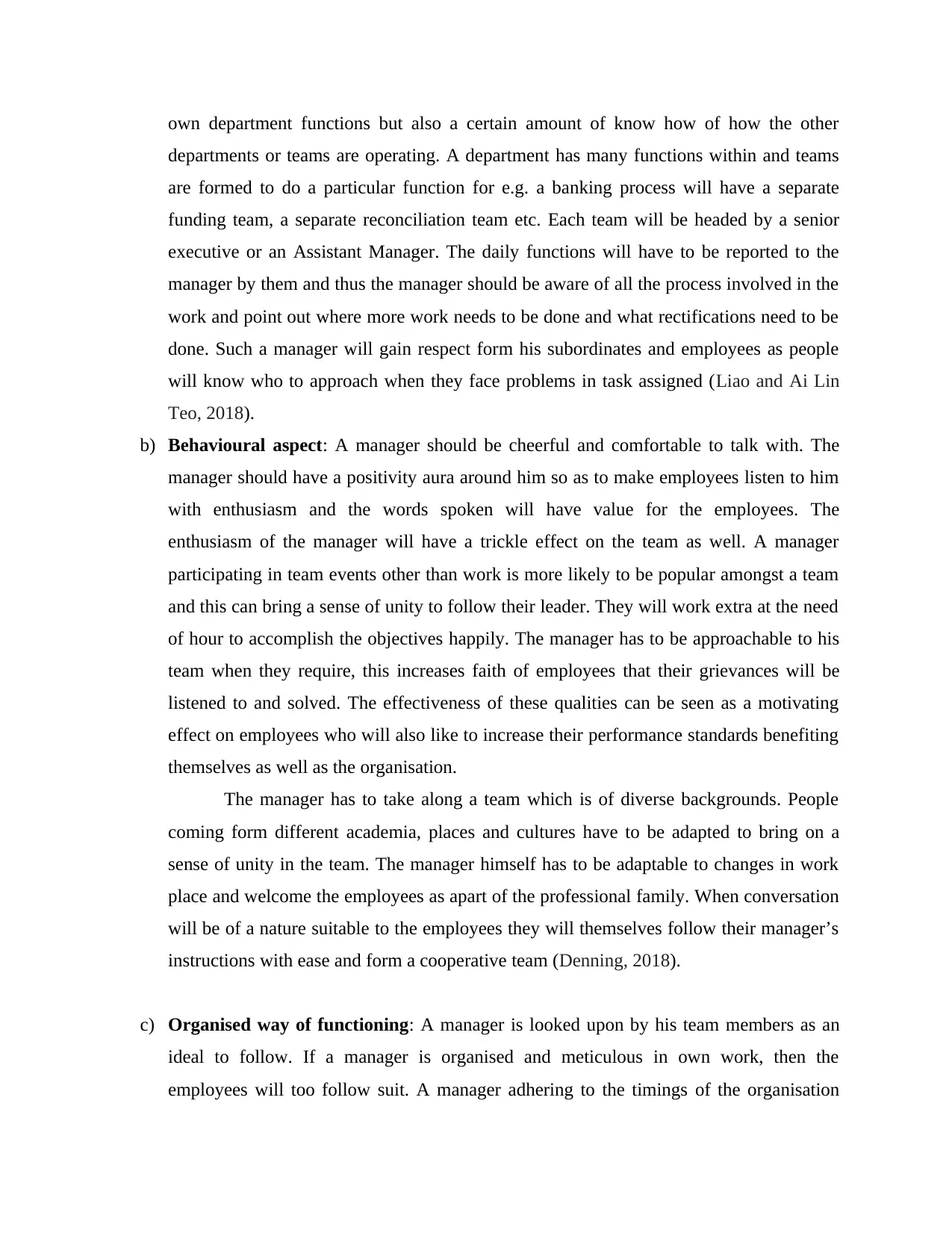
own department functions but also a certain amount of know how of how the other
departments or teams are operating. A department has many functions within and teams
are formed to do a particular function for e.g. a banking process will have a separate
funding team, a separate reconciliation team etc. Each team will be headed by a senior
executive or an Assistant Manager. The daily functions will have to be reported to the
manager by them and thus the manager should be aware of all the process involved in the
work and point out where more work needs to be done and what rectifications need to be
done. Such a manager will gain respect form his subordinates and employees as people
will know who to approach when they face problems in task assigned (Liao and Ai Lin
Teo, 2018).
b) Behavioural aspect: A manager should be cheerful and comfortable to talk with. The
manager should have a positivity aura around him so as to make employees listen to him
with enthusiasm and the words spoken will have value for the employees. The
enthusiasm of the manager will have a trickle effect on the team as well. A manager
participating in team events other than work is more likely to be popular amongst a team
and this can bring a sense of unity to follow their leader. They will work extra at the need
of hour to accomplish the objectives happily. The manager has to be approachable to his
team when they require, this increases faith of employees that their grievances will be
listened to and solved. The effectiveness of these qualities can be seen as a motivating
effect on employees who will also like to increase their performance standards benefiting
themselves as well as the organisation.
The manager has to take along a team which is of diverse backgrounds. People
coming form different academia, places and cultures have to be adapted to bring on a
sense of unity in the team. The manager himself has to be adaptable to changes in work
place and welcome the employees as apart of the professional family. When conversation
will be of a nature suitable to the employees they will themselves follow their manager’s
instructions with ease and form a cooperative team (Denning, 2018).
c) Organised way of functioning: A manager is looked upon by his team members as an
ideal to follow. If a manager is organised and meticulous in own work, then the
employees will too follow suit. A manager adhering to the timings of the organisation
departments or teams are operating. A department has many functions within and teams
are formed to do a particular function for e.g. a banking process will have a separate
funding team, a separate reconciliation team etc. Each team will be headed by a senior
executive or an Assistant Manager. The daily functions will have to be reported to the
manager by them and thus the manager should be aware of all the process involved in the
work and point out where more work needs to be done and what rectifications need to be
done. Such a manager will gain respect form his subordinates and employees as people
will know who to approach when they face problems in task assigned (Liao and Ai Lin
Teo, 2018).
b) Behavioural aspect: A manager should be cheerful and comfortable to talk with. The
manager should have a positivity aura around him so as to make employees listen to him
with enthusiasm and the words spoken will have value for the employees. The
enthusiasm of the manager will have a trickle effect on the team as well. A manager
participating in team events other than work is more likely to be popular amongst a team
and this can bring a sense of unity to follow their leader. They will work extra at the need
of hour to accomplish the objectives happily. The manager has to be approachable to his
team when they require, this increases faith of employees that their grievances will be
listened to and solved. The effectiveness of these qualities can be seen as a motivating
effect on employees who will also like to increase their performance standards benefiting
themselves as well as the organisation.
The manager has to take along a team which is of diverse backgrounds. People
coming form different academia, places and cultures have to be adapted to bring on a
sense of unity in the team. The manager himself has to be adaptable to changes in work
place and welcome the employees as apart of the professional family. When conversation
will be of a nature suitable to the employees they will themselves follow their manager’s
instructions with ease and form a cooperative team (Denning, 2018).
c) Organised way of functioning: A manager is looked upon by his team members as an
ideal to follow. If a manager is organised and meticulous in own work, then the
employees will too follow suit. A manager adhering to the timings of the organisation
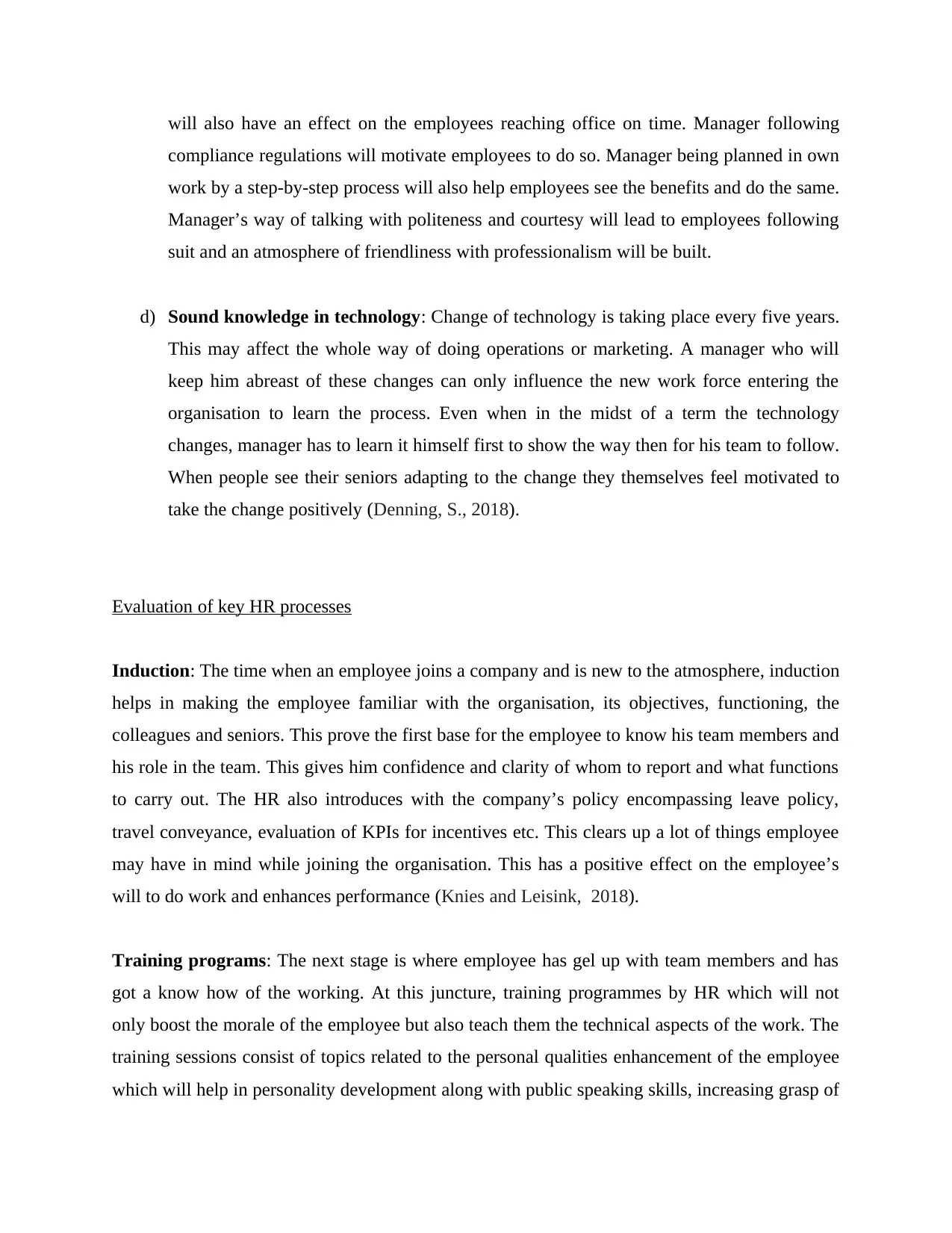
will also have an effect on the employees reaching office on time. Manager following
compliance regulations will motivate employees to do so. Manager being planned in own
work by a step-by-step process will also help employees see the benefits and do the same.
Manager’s way of talking with politeness and courtesy will lead to employees following
suit and an atmosphere of friendliness with professionalism will be built.
d) Sound knowledge in technology: Change of technology is taking place every five years.
This may affect the whole way of doing operations or marketing. A manager who will
keep him abreast of these changes can only influence the new work force entering the
organisation to learn the process. Even when in the midst of a term the technology
changes, manager has to learn it himself first to show the way then for his team to follow.
When people see their seniors adapting to the change they themselves feel motivated to
take the change positively (Denning, S., 2018).
Evaluation of key HR processes
Induction: The time when an employee joins a company and is new to the atmosphere, induction
helps in making the employee familiar with the organisation, its objectives, functioning, the
colleagues and seniors. This prove the first base for the employee to know his team members and
his role in the team. This gives him confidence and clarity of whom to report and what functions
to carry out. The HR also introduces with the company’s policy encompassing leave policy,
travel conveyance, evaluation of KPIs for incentives etc. This clears up a lot of things employee
may have in mind while joining the organisation. This has a positive effect on the employee’s
will to do work and enhances performance (Knies and Leisink, 2018).
Training programs: The next stage is where employee has gel up with team members and has
got a know how of the working. At this juncture, training programmes by HR which will not
only boost the morale of the employee but also teach them the technical aspects of the work. The
training sessions consist of topics related to the personal qualities enhancement of the employee
which will help in personality development along with public speaking skills, increasing grasp of
compliance regulations will motivate employees to do so. Manager being planned in own
work by a step-by-step process will also help employees see the benefits and do the same.
Manager’s way of talking with politeness and courtesy will lead to employees following
suit and an atmosphere of friendliness with professionalism will be built.
d) Sound knowledge in technology: Change of technology is taking place every five years.
This may affect the whole way of doing operations or marketing. A manager who will
keep him abreast of these changes can only influence the new work force entering the
organisation to learn the process. Even when in the midst of a term the technology
changes, manager has to learn it himself first to show the way then for his team to follow.
When people see their seniors adapting to the change they themselves feel motivated to
take the change positively (Denning, S., 2018).
Evaluation of key HR processes
Induction: The time when an employee joins a company and is new to the atmosphere, induction
helps in making the employee familiar with the organisation, its objectives, functioning, the
colleagues and seniors. This prove the first base for the employee to know his team members and
his role in the team. This gives him confidence and clarity of whom to report and what functions
to carry out. The HR also introduces with the company’s policy encompassing leave policy,
travel conveyance, evaluation of KPIs for incentives etc. This clears up a lot of things employee
may have in mind while joining the organisation. This has a positive effect on the employee’s
will to do work and enhances performance (Knies and Leisink, 2018).
Training programs: The next stage is where employee has gel up with team members and has
got a know how of the working. At this juncture, training programmes by HR which will not
only boost the morale of the employee but also teach them the technical aspects of the work. The
training sessions consist of topics related to the personal qualities enhancement of the employee
which will help in personality development along with public speaking skills, increasing grasp of
⊘ This is a preview!⊘
Do you want full access?
Subscribe today to unlock all pages.

Trusted by 1+ million students worldwide
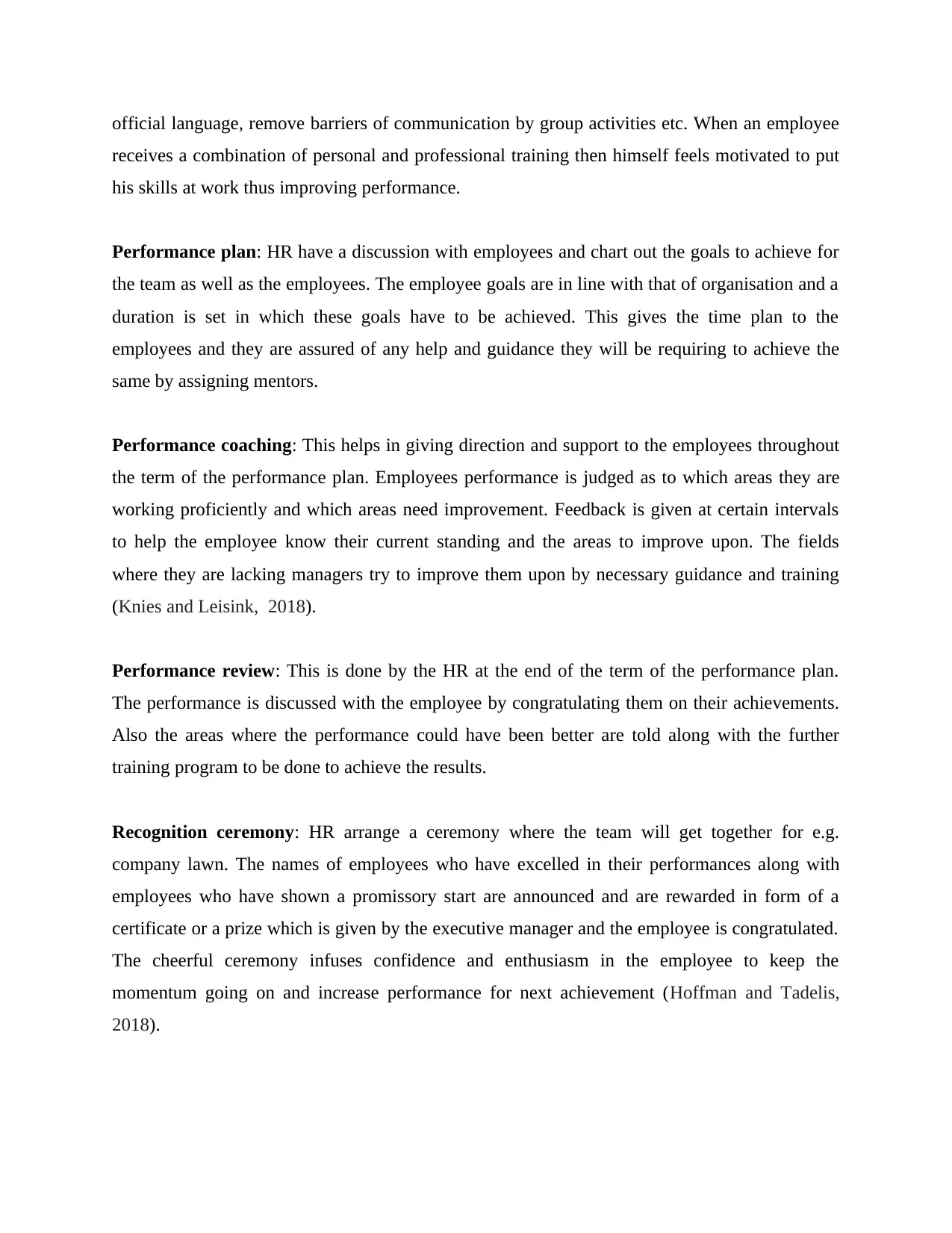
official language, remove barriers of communication by group activities etc. When an employee
receives a combination of personal and professional training then himself feels motivated to put
his skills at work thus improving performance.
Performance plan: HR have a discussion with employees and chart out the goals to achieve for
the team as well as the employees. The employee goals are in line with that of organisation and a
duration is set in which these goals have to be achieved. This gives the time plan to the
employees and they are assured of any help and guidance they will be requiring to achieve the
same by assigning mentors.
Performance coaching: This helps in giving direction and support to the employees throughout
the term of the performance plan. Employees performance is judged as to which areas they are
working proficiently and which areas need improvement. Feedback is given at certain intervals
to help the employee know their current standing and the areas to improve upon. The fields
where they are lacking managers try to improve them upon by necessary guidance and training
(Knies and Leisink, 2018).
Performance review: This is done by the HR at the end of the term of the performance plan.
The performance is discussed with the employee by congratulating them on their achievements.
Also the areas where the performance could have been better are told along with the further
training program to be done to achieve the results.
Recognition ceremony: HR arrange a ceremony where the team will get together for e.g.
company lawn. The names of employees who have excelled in their performances along with
employees who have shown a promissory start are announced and are rewarded in form of a
certificate or a prize which is given by the executive manager and the employee is congratulated.
The cheerful ceremony infuses confidence and enthusiasm in the employee to keep the
momentum going on and increase performance for next achievement (Hoffman and Tadelis,
2018).
receives a combination of personal and professional training then himself feels motivated to put
his skills at work thus improving performance.
Performance plan: HR have a discussion with employees and chart out the goals to achieve for
the team as well as the employees. The employee goals are in line with that of organisation and a
duration is set in which these goals have to be achieved. This gives the time plan to the
employees and they are assured of any help and guidance they will be requiring to achieve the
same by assigning mentors.
Performance coaching: This helps in giving direction and support to the employees throughout
the term of the performance plan. Employees performance is judged as to which areas they are
working proficiently and which areas need improvement. Feedback is given at certain intervals
to help the employee know their current standing and the areas to improve upon. The fields
where they are lacking managers try to improve them upon by necessary guidance and training
(Knies and Leisink, 2018).
Performance review: This is done by the HR at the end of the term of the performance plan.
The performance is discussed with the employee by congratulating them on their achievements.
Also the areas where the performance could have been better are told along with the further
training program to be done to achieve the results.
Recognition ceremony: HR arrange a ceremony where the team will get together for e.g.
company lawn. The names of employees who have excelled in their performances along with
employees who have shown a promissory start are announced and are rewarded in form of a
certificate or a prize which is given by the executive manager and the employee is congratulated.
The cheerful ceremony infuses confidence and enthusiasm in the employee to keep the
momentum going on and increase performance for next achievement (Hoffman and Tadelis,
2018).
Paraphrase This Document
Need a fresh take? Get an instant paraphrase of this document with our AI Paraphraser
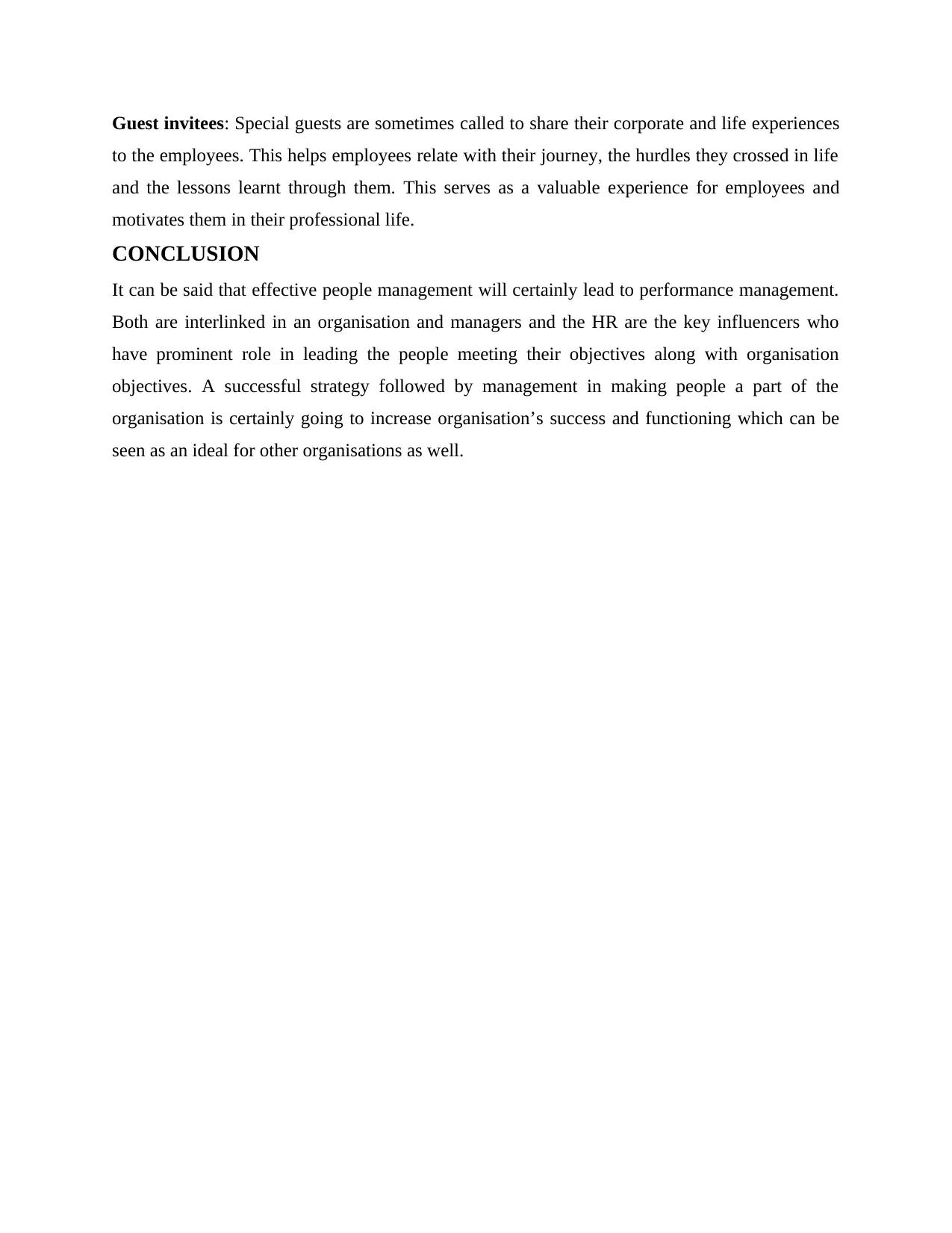
Guest invitees: Special guests are sometimes called to share their corporate and life experiences
to the employees. This helps employees relate with their journey, the hurdles they crossed in life
and the lessons learnt through them. This serves as a valuable experience for employees and
motivates them in their professional life.
CONCLUSION
It can be said that effective people management will certainly lead to performance management.
Both are interlinked in an organisation and managers and the HR are the key influencers who
have prominent role in leading the people meeting their objectives along with organisation
objectives. A successful strategy followed by management in making people a part of the
organisation is certainly going to increase organisation’s success and functioning which can be
seen as an ideal for other organisations as well.
to the employees. This helps employees relate with their journey, the hurdles they crossed in life
and the lessons learnt through them. This serves as a valuable experience for employees and
motivates them in their professional life.
CONCLUSION
It can be said that effective people management will certainly lead to performance management.
Both are interlinked in an organisation and managers and the HR are the key influencers who
have prominent role in leading the people meeting their objectives along with organisation
objectives. A successful strategy followed by management in making people a part of the
organisation is certainly going to increase organisation’s success and functioning which can be
seen as an ideal for other organisations as well.
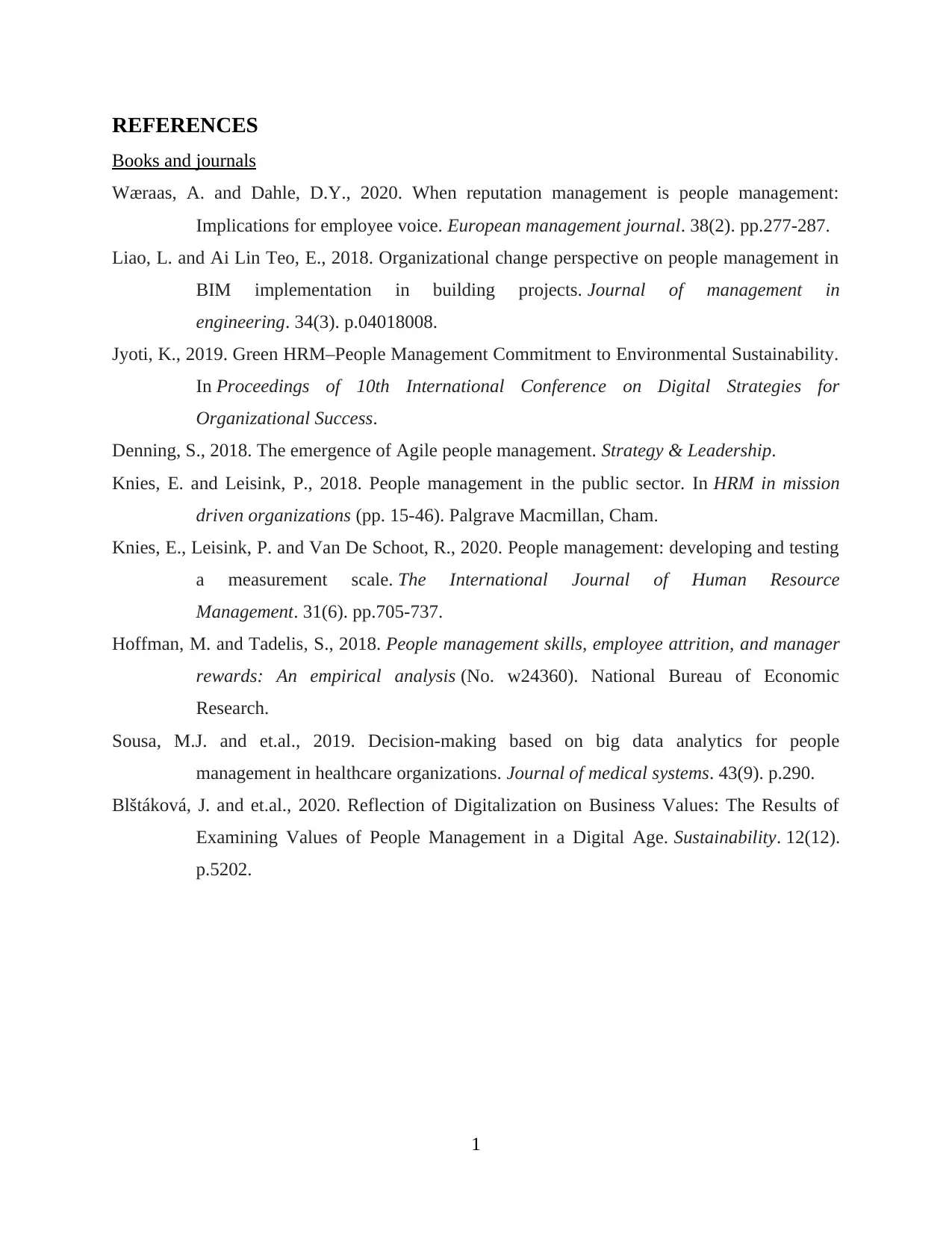
REFERENCES
Books and journals
Wæraas, A. and Dahle, D.Y., 2020. When reputation management is people management:
Implications for employee voice. European management journal. 38(2). pp.277-287.
Liao, L. and Ai Lin Teo, E., 2018. Organizational change perspective on people management in
BIM implementation in building projects. Journal of management in
engineering. 34(3). p.04018008.
Jyoti, K., 2019. Green HRM–People Management Commitment to Environmental Sustainability.
In Proceedings of 10th International Conference on Digital Strategies for
Organizational Success.
Denning, S., 2018. The emergence of Agile people management. Strategy & Leadership.
Knies, E. and Leisink, P., 2018. People management in the public sector. In HRM in mission
driven organizations (pp. 15-46). Palgrave Macmillan, Cham.
Knies, E., Leisink, P. and Van De Schoot, R., 2020. People management: developing and testing
a measurement scale. The International Journal of Human Resource
Management. 31(6). pp.705-737.
Hoffman, M. and Tadelis, S., 2018. People management skills, employee attrition, and manager
rewards: An empirical analysis (No. w24360). National Bureau of Economic
Research.
Sousa, M.J. and et.al., 2019. Decision-making based on big data analytics for people
management in healthcare organizations. Journal of medical systems. 43(9). p.290.
Blštáková, J. and et.al., 2020. Reflection of Digitalization on Business Values: The Results of
Examining Values of People Management in a Digital Age. Sustainability. 12(12).
p.5202.
1
Books and journals
Wæraas, A. and Dahle, D.Y., 2020. When reputation management is people management:
Implications for employee voice. European management journal. 38(2). pp.277-287.
Liao, L. and Ai Lin Teo, E., 2018. Organizational change perspective on people management in
BIM implementation in building projects. Journal of management in
engineering. 34(3). p.04018008.
Jyoti, K., 2019. Green HRM–People Management Commitment to Environmental Sustainability.
In Proceedings of 10th International Conference on Digital Strategies for
Organizational Success.
Denning, S., 2018. The emergence of Agile people management. Strategy & Leadership.
Knies, E. and Leisink, P., 2018. People management in the public sector. In HRM in mission
driven organizations (pp. 15-46). Palgrave Macmillan, Cham.
Knies, E., Leisink, P. and Van De Schoot, R., 2020. People management: developing and testing
a measurement scale. The International Journal of Human Resource
Management. 31(6). pp.705-737.
Hoffman, M. and Tadelis, S., 2018. People management skills, employee attrition, and manager
rewards: An empirical analysis (No. w24360). National Bureau of Economic
Research.
Sousa, M.J. and et.al., 2019. Decision-making based on big data analytics for people
management in healthcare organizations. Journal of medical systems. 43(9). p.290.
Blštáková, J. and et.al., 2020. Reflection of Digitalization on Business Values: The Results of
Examining Values of People Management in a Digital Age. Sustainability. 12(12).
p.5202.
1
⊘ This is a preview!⊘
Do you want full access?
Subscribe today to unlock all pages.

Trusted by 1+ million students worldwide

2
1 out of 10
Related Documents
Your All-in-One AI-Powered Toolkit for Academic Success.
+13062052269
info@desklib.com
Available 24*7 on WhatsApp / Email
![[object Object]](/_next/static/media/star-bottom.7253800d.svg)
Unlock your academic potential
Copyright © 2020–2026 A2Z Services. All Rights Reserved. Developed and managed by ZUCOL.





